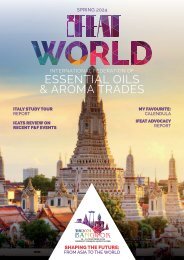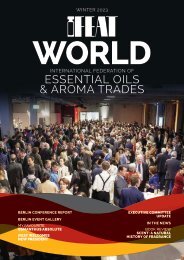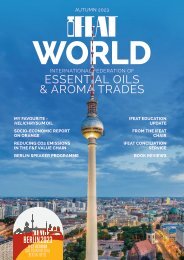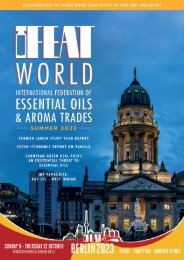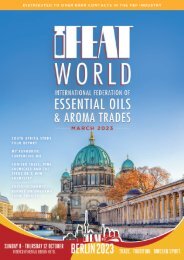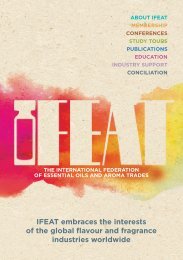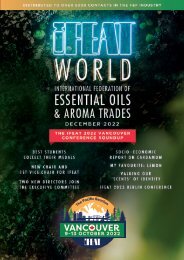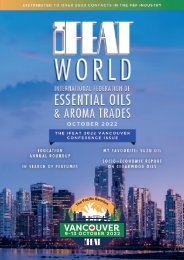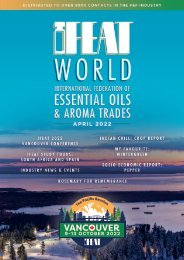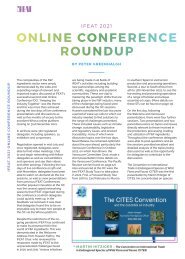IFEATWORLD July 2022
A Members' Newsletter for the International Federation of Essential Oils & Aroma Trades.
A Members' Newsletter for the International Federation of Essential Oils & Aroma Trades.
You also want an ePaper? Increase the reach of your titles
YUMPU automatically turns print PDFs into web optimized ePapers that Google loves.
16<br />
WORLD<br />
THE NEW EU CHEMICAL STRATEGY FOR SUSTAINABILITY CSS<br />
COVERS REGULATORY AND NON REGULATORY MEASURES<br />
THE EU GREEN DEAL AND CHEMICALS STRATEGY FOR SUSTAINABILITY (CSS)<br />
Key regulatory actions Key non-regulatory actions<br />
STRENGTHENING EU’S STRATEGIC AUTONOMY<br />
• Identification of strategic dependencies and value chains<br />
• Engage with stakeholders to increase the EU’s strategic foresight on chemicals<br />
SUPPORTING INNOVATION TOWARDS SUSTAINABLE CHEMICALS<br />
• Develop safe and sustainable by design criteria<br />
• Funding advanced materials, smart technologies and new business models<br />
PROMOTE UNITED NATIONS GLOBALLY HARMONIZED SYSTEM (GHS) GLOBALLY<br />
2020 2021 <strong>2022</strong> 2023 2024<br />
products. IFRA advocates that the<br />
introduction of new hazard classes<br />
should first take place under the<br />
UN Globally Harmonized System<br />
of Classification and Labelling of<br />
Chemicals to ensure a level playing<br />
field.<br />
A further issue relates to the<br />
compliance, enforcement, and<br />
enforceability of the proposed new<br />
CSS framework legislation. IFRA and<br />
its industry partners advocate that<br />
no restrictions or bans should be<br />
adopted if enforceability cannot be<br />
demonstrated by the EU, ensuring that<br />
responsible actors are not negatively<br />
impacted by such new rules. A<br />
Commission-sponsored high-level<br />
roundtable, including industry CEOs,<br />
has been looking at this point and has<br />
jointly with the Commission developed<br />
recommendations.<br />
Since the launch of the CSS proposals,<br />
IFRA has been actively engaged<br />
in the political process, working<br />
directly with politicians, regulators,<br />
industry partner associations, think<br />
tanks and other stakeholders. We<br />
have expressed our concerns about<br />
COMMISSION ESTABLISHED A HIGH-LEVEL ROUNDTABLE WITH STAKEHOLDERS,<br />
INCL. INDUSTRY REPRESENTATIVES TO REALISE THE STRATEGY’S OBJECTIVES<br />
SETTING ESSENTIAL USE CRITERIA<br />
TARGETED RE-OPENING OF REACH<br />
CLASSIFICATION, LABELLING AND PACKAGING (CLP)<br />
New hazard categories endocrine disruptors<br />
& persistent chemicals<br />
IMPLEMENT ONE SUBSTANCE ONE ASSESSMENT<br />
certain elements of the CSS to the<br />
Commission, responded to all relevant<br />
EU consultations and started political<br />
outreach in Brussels and, with the<br />
support of IFRA’s network of National<br />
Associations, in EU member states.<br />
In France, for example, growers of<br />
lavender and other raw materials in<br />
the south of France have mounted<br />
a strong advocacy campaign with a<br />
focus on specific local issues resulting<br />
from the proposals, complementing<br />
IFRA’s high-level messaging.<br />
Data underpins our approach. IFRA<br />
has commissioned a socio-economic<br />
impact assessment of the CSS on the<br />
fragrance industry. The study is based<br />
on the common EU Better Regulation<br />
Methodology, a methodology also<br />
followed in similar CSS impact<br />
assessment studies by partner<br />
associations. Thirty companies, large<br />
and small, have contributed data to<br />
the report, looking at the impact on<br />
the range of fragrance ingredients in<br />
use today and determining how the<br />
tougher new CSS rules – including<br />
greater scrutiny of low-tonnage<br />
ingredients, grouping of materials for<br />
assessment, and essential use criteria<br />
– would affect their use in consumer<br />
products.<br />
This in-depth report will be published<br />
before the summer and will be one<br />
of the key pieces of evidence for the<br />
fragrance industry as we seek to<br />
shape the CSS and ensure it is both an<br />
ambitious and workable policy.<br />
In conclusion, the EU stated its<br />
intention to depart from existing<br />
processes and introduced a paradigm<br />
shift in European legislation through<br />
the CSS. The EU also signalled its<br />
desire to accelerate and simplify the<br />
legislative process through novel<br />
concepts like essentiality, or through<br />
the Generic Risk Approach, the One<br />
Substance, One Assessment Approach,<br />
as well as through non-regulatory<br />
actions to support innovation towards<br />
sustainable chemicals and develop<br />
safe and sustainable by design criteria<br />
for such approaches.<br />
<strong>2022</strong> is therefore a pivotal year. By<br />
strengthening voices from throughout<br />
the fragrance value chain and beyond,<br />
we can build a coalition to ensure a<br />
reasonable, proportionate, and science-




